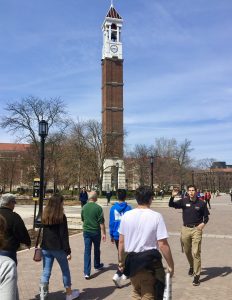We all have a lot on our minds with the COVID-19 pandemic unfolding and the worst still to come. I know we have more important questions to address right now, but it won’t be long until our high school juniors and families are starting to raise issues of college applications for students whose spring semester has been so disrupted.

A campus tour at Purdue University, 2019.
School closures have been variable and unpredictable. Distance learning rollouts are all over the place. I don’t think anyone knows for sure if we’ll return to school, when, how, and what will happen in between. Students certainly won’t learn what they were supposed to learn had everything gone according to plan. We won’t have consistent decisions about what “semester” even means this year, let alone consistency when it comes to grading.
As the parent of a high school junior, I’m paying closer attention to this question than many other parents, perhaps, and my older son is a college freshman, only a little more than a year removed from the college application process. I’m also a teacher advisor at the school where I teach, which means I play a supporting role in the college application process for about 25 of my advisees each year. As a result, I have some insights that might be useful and some suggestions that colleges and high schools could consider to make next year’s college application manageable and reasonable for everyone. I propose the following:
- No early decision (ED) applications next year. (This is the most restrictive early application option; students can only apply ED to one college and they commit to going there if accepted – in December). Every senior next year deserves the chance to put one more semester’s worth of grades into their application, since Spring 2020 will be such a mess of inconsistency and lost opportunity.
- Push all application deadlines late enough into 2021 to make first semester senior grades part of the application.
- For systems like the University of California, where students self-report grades for four semesters (later verified with official transcripts), allow the option to use first-semester senior grades in place of second-semester junior year grades.
- To make the college admissions process more manageable on a shortened timeline, we need a system or an agreement to limit seniors to 10 total applications. (The College Board suggests 5-8 applications). This should reduce the number of applications overall so that admissions offices can cope with the delayed process. (They might need to push all related processes and dates back slightly as well). Many students don’t apply to that many colleges, but many students in my experience apply to 15, 20, or more. I try to discourage that as much as possible when talking to my advisees, but there’s a sense that “everyone else is doing it, so I have to do it too.” I’d actually like to see that kind of limit put in place somehow regardless of COVID-19. Students who can afford to apply to that many schools are already privileged, and they’re essentially hoarding way more acceptances they can’t use, to the detriment of worthy applicants who actually want to go to some of those schools, and haven’t applied so indiscriminately (maybe because they can’t afford to).
There are many other ways that the college application process needs fixing in order to restore some balance and sanity to the process, and to improve fairness and access, but there has already been plenty written about legacy admissions and the outsized role of standardized testing in college admissions. For now, I think these suggestions above are reasonable and worth exploring for the benefit of high schoolers in the Classes of 2021 and 2022. What are your thoughts? Could these ideas help?

One note: I mentioned early decision applications above, and didn’t really discuss early action – similar idea, less binding on the student. There’s a variety of early action models and more varying timelines, so I just left it out of the discussion, but in retrospect, I probably just should have proposed no early action as well. Bottom line, let everyone get a hopefully complete semester of senior year into their application, putting things back on somewhat even footing hopefully.